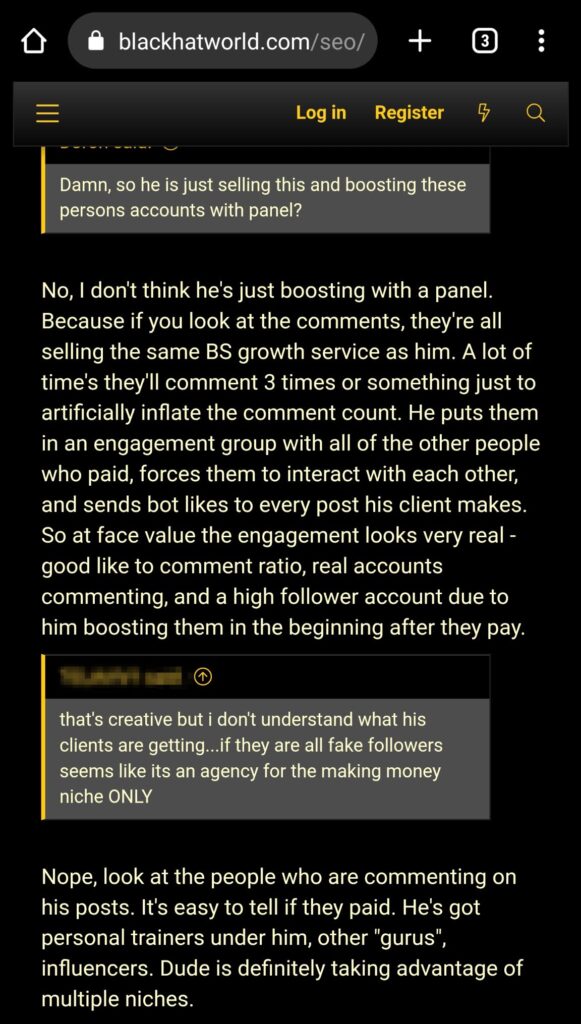I got a DM (Direct Message) on Instagram last week from someone I don’t know (not connected). Of course, I know it’s spam. But I checked out the message nonetheless.
This DM was ‘promoting’ a digital agency. Interesting. I then checked out the profile. Down I went into the rabbit hole. Did I get to crawl out unscathed?

I write and talk about (my brand!) non-sleazy and no-scam marketing. That doesn’t mean I don’t get tempted by ‘quick and easy solutions’ at times. It’s tempting seeing a large number of testimonials swearing by the services offered by this agency (run by a really young dude).
This tactic – using ghost or fake accounts to DM people – is rampant. And I check out every one of those promoted accounts to see who is buying into these DM tactics and that’s how I got to understand that many influencers grow their accounts using one of those methods. So in many ways, the huge numbers you see are not real in most cases.
Now about this agency, are they using the same DM (that they used to find me so to speak) method for their clients?

After digging around for less than 10 minutes I came across a post exposing the actual method they use. The client puts down the set-up cost (all in USD) anywhere between $1,500 and $100,000 and a monthly retainer from $150 to $2,000. Once the payments start coming in, the dude who owns the agency starts liking the client’s posts (a huge boost for the post because the algorithm treats accounts with huge follower numbers differently – as I write this he has over 400K). The client would also be placed in a pool of other people (an engagement group) who are encouraged to like/comment on each other’s posts.
All the while the agency would still use a bot to like/comment on posts so that the posts look as though they are actually engaging content. In a way, this is like a pyramid scheme. It’s quite clever and this method, along with the mass DMing, tends to fall through the cracks of Instagram’s policy.
After this little investigation, my initial curiosity of ‘what if’ has dissipated completely. After all, it turned out to be, yes, that’s right a ‘scam’.
Scams such as this exist because of our human nature – we want things to be easy and given the choice, we may be tempted to cheat**, all the while justifying and rationalising the legitimacy of the scam.
Where does it leave us? There’s a Buddhist saying: “There are always two choices. Two paths to take. One is easy. And its only reward is that it’s easy.”
First of all, these huge follower numbers do not neatly equate to increased revenue. Sales are more related to the engagement of followers rather than the number of followers. If followers are being generated by any means possible, many followers may have little or no engagement.
Building a strong and authentic brand is the only guaranteed way to ensure your followers are properly engaged with who you are and how your business offers solutions for their own personal situations.
Once the brand is designed/built and established, the work of business development has to happen alongside.
Having a lot of falsely-generated followers won’t help us with that. We really do have to do the work. Hiring a digital agency to inflate follower numbers is the easy path, but it won’t get you the rewards you truly seek and the lifestyle you deserve. At times, we want to ‘outsource’ it all and just be done with it. That’s why these scammy businesses are making so much money. They take advantage of our human folly.
It’s a hard pill to swallow. Let that make you a bit angry and give you renewed energy. That’s what I felt.
There’s another well-known saying: “Hell is full of good meanings, but heaven is full of good works“. We can not only have good intentions but we can also fill our days with good work. There is an easy path you can take, but it’s a scam that will most likely end up with you having less money, not more. As always, take claims of an easy path to success with a giant pinch of salt!
In the next dispatch, I’ll share my non-sleazy hack of creating a brand that helped me get to where I am today.
See you in a couple of days.
** According to Dan Ariely, behavioural economist, (the author of Predictably Irrational), people cheat when they have a chance to do so. In other words, we are more than likely to cheat. There’s no ‘maybe’ about it.







